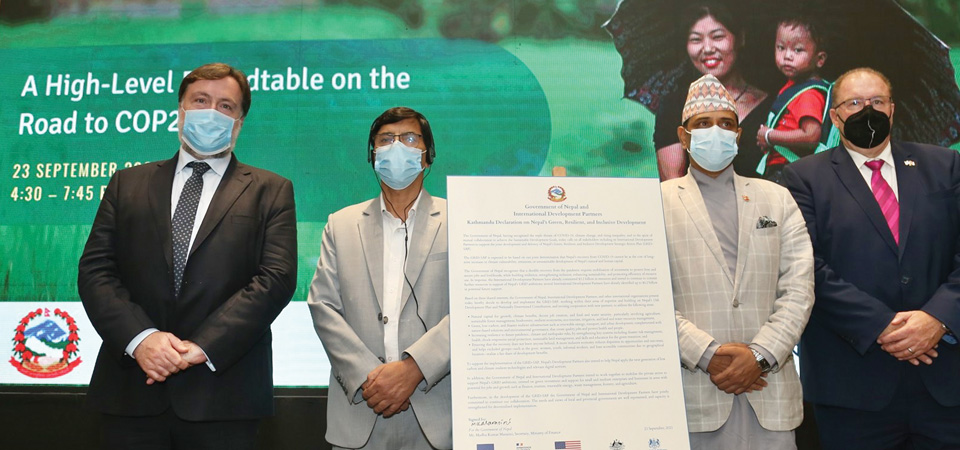Govt, donors join hands for green, inclusive development

By A Staff Reporter
Kathmandu, Sept. 26: The government of Nepal and development partners endorsed the landmark ‘Kathmandu Declaration’ yesterday to develop a strategic action plan for Nepal towards Green, Resilient, and Inclusive Development (GRID).
The Declaration was endorsed by the Ministry of Finance on behalf of the government of Nepal, Asian Development Bank, Australia, European Union, Finland, France, Germany, International Monetary Fund, Norway, Republic of Korea, Switzerland, United Kingdom, United Nations, United States, and the World Bank at a high-level roundtable event titled Nepal’s Transition to Green, Resilient, and Inclusive Development (GRID) for Sustainable Recovery, Growth, and Jobs.
Under the Kathmandu Declaration, Nepal’s development partners have identified up to $4.2 billion in potential future support, in addition to the $3.2 billion in previously committed resources to support GRID, according to a press statement of the WB.
The GRID Strategic Action Plan will coordinate international and domestic financing for priority investments in Nepal’s recovery from the crisis caused by the COVID-19 pandemic.
“The Government of Nepal is committed to the Green, Resilient, and Inclusive Development vision that will support Nepal’s recovery from the COVID-19 pandemic and help address the challenges of climate change and rising inequality,” said Finance Minister Janardan Sharma. “We look forward to working together with development partners, private sector, and key stakeholders to build back Nepal better and stronger.”
Investments will support Nepal’s 15th development plan, Nationally Determined Contribution to the Paris Climate Accords, and the Sustainable Development Goals in promoting green growth, jobs, and infrastructure, and building resilience to climate change and shocks from disasters, as well as equitable access to services for Nepalis.
The government and development partners intend to scale up support for such areas as sustainable tourism, renewable energy, cleaner transport and resilient roads, integrated solid waste management, sustainable forest management, watershed protection and water supply, biodiversity conservation, adaptive social protection, climate-smart agriculture, and sustainable cities.
Partnerships and opportunities will be sought with the private sector to increase green investment and support job-creating small and medium enterprises and businesses in these and other areas.
Nepal’s GRID vision also emphasises inclusion to enable women, indigenous groups, and vulnerable and marginalized communities to realize the benefits of a green, resilient recovery. This includes skills training and education opportunities to help citizens prepare for an evolving job market in a new green economy with greater opportunities for all Nepalis.
The roundtable, organised in the lead up to COP26, included representatives from the federal and local government, development partners, private sector, and climate experts.
Recent News

Do not make expressions casting dout on election: EC
14 Apr, 2022
CM Bhatta says may New Year 2079 BS inspire positive thinking
14 Apr, 2022
Three new cases, 44 recoveries in 24 hours
14 Apr, 2022
689 climbers of 84 teams so far acquire permits for climbing various peaks this spring season
14 Apr, 2022
How the rising cost of living crisis is impacting Nepal
14 Apr, 2022
US military confirms an interstellar meteor collided with Earth
14 Apr, 2022
Valneva Covid vaccine approved for use in UK
14 Apr, 2022
Chair Prachanda highlights need of unity among Maoist, Communist forces
14 Apr, 2022
Ranbir Kapoor and Alia Bhatt: Bollywood toasts star couple on wedding
14 Apr, 2022
President Bhandari confers decorations (Photo Feature)
14 Apr, 2022










